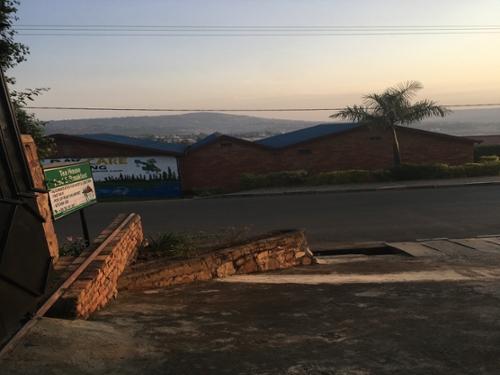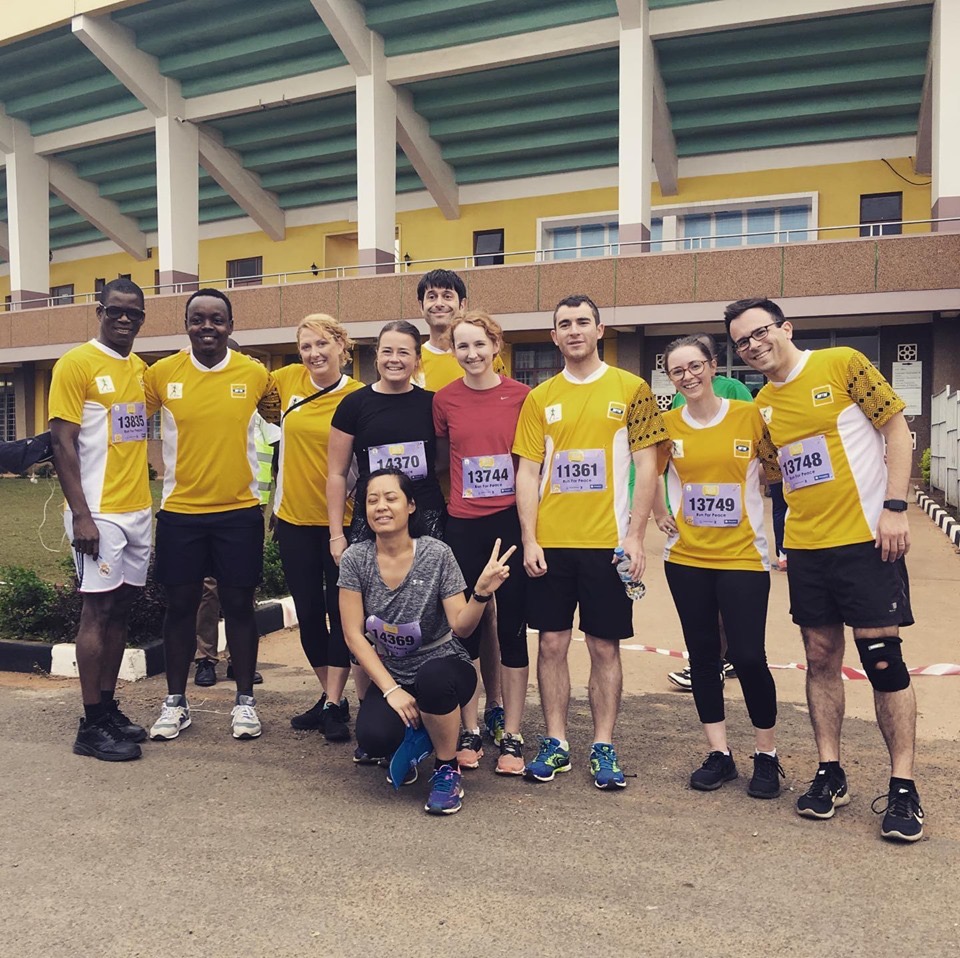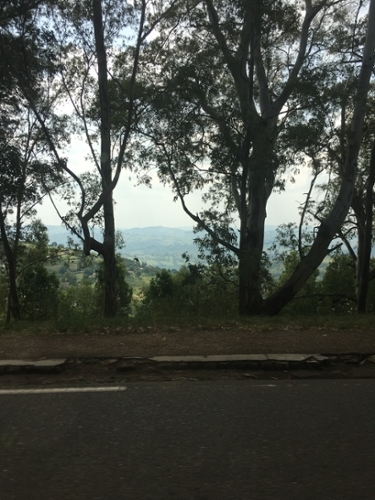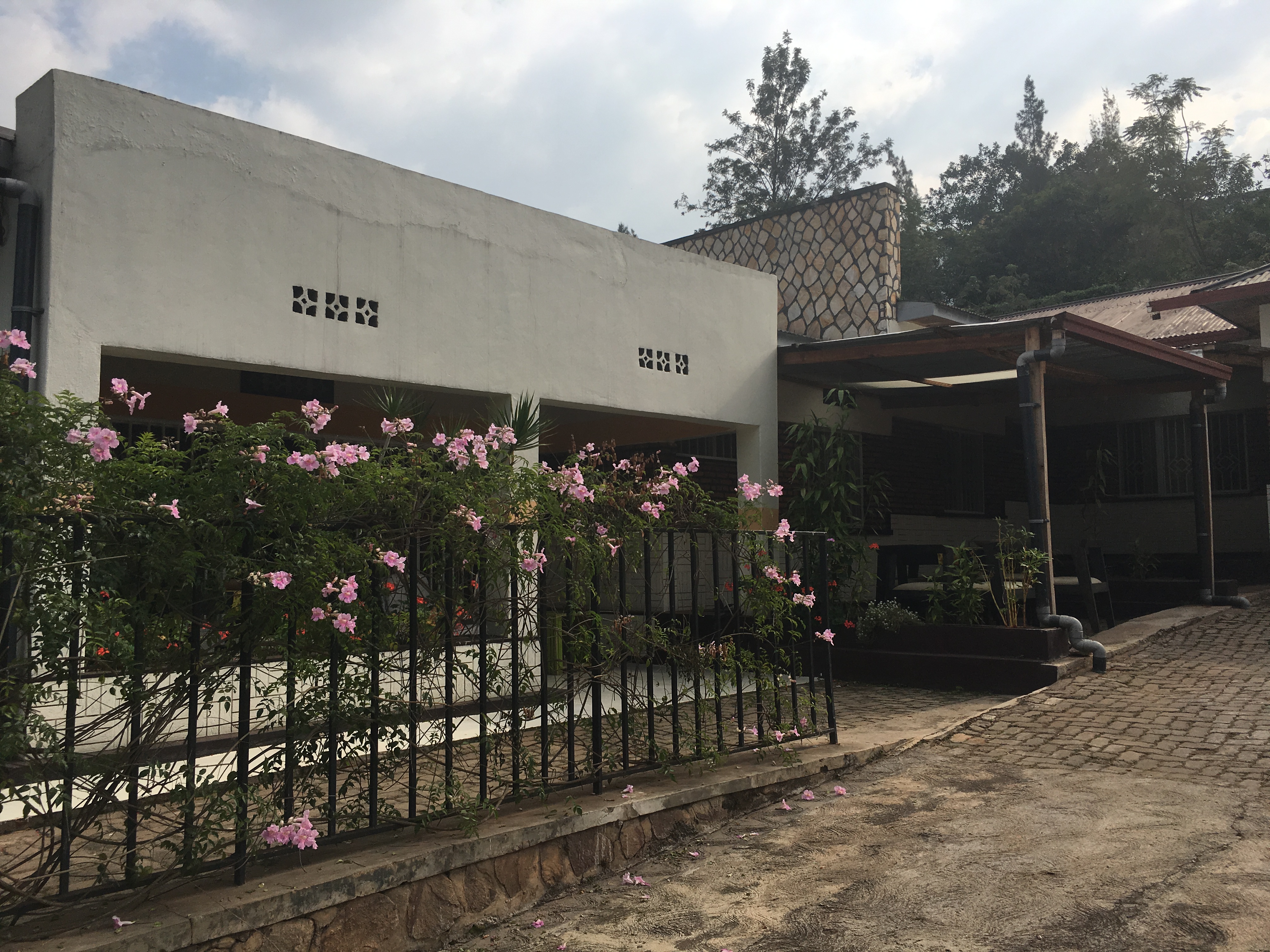The One Where I Go For a Run
On Transience
People are in a constant state of motion here. I see hundreds of people on my walk to and from work everyday, braving the crazy traffic by walking along the side of the road, gripping the back handle of their moto as their driver carelessly weaves through cars, or squished into an over-packed bus. Perhaps the most transient people in this country, though, are the expats. In just the three short weeks I’ve been here, I’ve learned how  to say hello and goodbye pretty regularly. Each week, I’ll have a new group of running buddies or housemates or vacation partners. Many people here work for international organizations, and they get a project or a job for a few months or a year or two. I’ve become accustomed to getting caught in conversations about future events that I, or another member of the group, won’t be around for. It’s a weird feeling knowing that your way of life has an end date. I feel nonchalant and rushed at the same time. Nonchalant because I figure that I won’t be here for too much longer so I may as well not set down any roots, but rushed to develop some sort of routine and adapt to my surroundings quickly. I’ve felt this way before because I moved a lot growing up, but it’s different now that everyone around me feels the same way. We all know that the very next day, one of us could be off to another country or get reassigned to a different village. Amidst the confusion and anxiety that this inevitably causes, it’s almost comforting knowing that I’m not alone
to say hello and goodbye pretty regularly. Each week, I’ll have a new group of running buddies or housemates or vacation partners. Many people here work for international organizations, and they get a project or a job for a few months or a year or two. I’ve become accustomed to getting caught in conversations about future events that I, or another member of the group, won’t be around for. It’s a weird feeling knowing that your way of life has an end date. I feel nonchalant and rushed at the same time. Nonchalant because I figure that I won’t be here for too much longer so I may as well not set down any roots, but rushed to develop some sort of routine and adapt to my surroundings quickly. I’ve felt this way before because I moved a lot growing up, but it’s different now that everyone around me feels the same way. We all know that the very next day, one of us could be off to another country or get reassigned to a different village. Amidst the confusion and anxiety that this inevitably causes, it’s almost comforting knowing that I’m not alone  in figuring out how to constantly adapt and uproot.
in figuring out how to constantly adapt and uproot.
Shifting to a different form of transience, I participated in the Kigali Peace Marathon 10k Run for Peace this past weekend. It was an untimed 10 kilometer (6.2 mile) race through the car-free streets of Kigali. It was quite hilly, and I started out way too fast, but I ended up placing as the fourth women! The 10k started before the half marathon and full marathon through Kigali, and as I was crossing the finish line, the half and full marathoners took off sprinting. Afterwards, I met up with some members of a running club I run with on Wednesdays, and we enjoyed a relaxing brunch at a coffeehouse along the half and full marathon course. As I scarfed down my latte and egg and cheese croissant, I watched the leaders of the half and full marathon run past me, maintaining a faster pace than I ran my 10k at.
On Working
For the first part of this week, I cleaned up a database RBJ has of closed cases of women detainees. Although most of this work was rather administrative, it was a great chance to learn a bit more about what people are imprisoned for in the country. Many women I came across were being held for typical crimes, like theft and drugs. However, there were some crimes that aren’t common to the US. For example, genocide ideology is a crime. According to The New Times, in 2018, genocide ideology was removed from the Penal Code, which was added as a crime in 2008, and re-passed by the Lower Chamber of the Parliament as a Special Law. Huffington Post defines genocide ideology as thoughts inferred from speech and actions that “proposes or implies that a particular group of people (such as an ethnic or religious group) should be destroyed.” In the US, on the other hand, you can’t be criminally prosecuted for thoughts. Our laws only prosecute people for direct or indirect actions taken in relation to a crime.
I also received a few new projects from the Geneva office of International Bridges to Justice. IBJ is the umbrella organization of Rwanda Bridges to Justice and is based in Geneva, Switzerland. Some of my classmates are working at the Geneva office this summer, so IBJ is well accustomed to William & Mary Law students. I was tasked with updating the Wiki pages for Burundi and Rwanda. These pages are sources of legal information on a Wikipedia-like platform. They provide background information and serve as an aggregate source for laws of nearly every country. This is incredibly useful because many countries do not keep a uniform database of their laws and important court decisions, and it can be difficult to find this information in English. The pages for Rwanda and Burundi were last updated in 2017, so I have to go find laws and court decisions that have been changed or added within the past three years to the information already on file. I started with Rwanda because I’m in the country, so I figured it would be a good way to learn more about the law here. Thankfully, Rwanda issues Official Gazettes every few weeks in English that updates the relevant legal codes. It has been very easy to find the changes and additions to the information on the Wiki page because these Official Gazettes are made public through the Prime Minister’s website.
On Friday, I traveled with my colleague to the Southern Province of Rwanda to pass out T-shirts and money to  student volunteers. This marked the end of the Rights Awareness campaign in Huye, which I completed a report about my first week at work. The drive was about three hours one way, so I had a lot of time to look at the beautiful scenery in the small villages we passed through. I also talked to a law student who came along for the ride to help pass out shirts and money at the law school in Huye. We traded stories about our law school experiences and jobs. In Rwanda, a law degree can be earned as a bachelor’s degree, meaning students right out of high school can enter law school. However, they have to go through a few years of training once they finish their degree before they can become a licensed lawyer. Many of my colleagues and people I have talked to are surprised to find out that in the US, you can’t earn a bachelor’s degree in law. In many countries, earning a bachelor’s in law is the norm!
student volunteers. This marked the end of the Rights Awareness campaign in Huye, which I completed a report about my first week at work. The drive was about three hours one way, so I had a lot of time to look at the beautiful scenery in the small villages we passed through. I also talked to a law student who came along for the ride to help pass out shirts and money at the law school in Huye. We traded stories about our law school experiences and jobs. In Rwanda, a law degree can be earned as a bachelor’s degree, meaning students right out of high school can enter law school. However, they have to go through a few years of training once they finish their degree before they can become a licensed lawyer. Many of my colleagues and people I have talked to are surprised to find out that in the US, you can’t earn a bachelor’s degree in law. In many countries, earning a bachelor’s in law is the norm!
On Living
 I’m starting to feel a lot more comfortable living in Kigali, which seems about right for week three. I’ve started to establish a good routine of working, running, traveling, and relaxing. Although I’m still struggling to wake up early to run by myself, I’ve managed to drag myself out of bed on Tuesday and Thursday mornings to run with a group. I’ve also discovered GrocWheels, which is a grocery delivery service that allows you to order fresh fruits and vegetables from the market without getting out of bed. This has proved much more affordable than going to the supermarket or traveling to the market myself, where I would have to pay higher prices because I’m a foreigner. I still want to visit the market to experience the atmosphere, but I’m saving that for one of my last weekends when I’ll be on the hunt for great souvenirs!
I’m starting to feel a lot more comfortable living in Kigali, which seems about right for week three. I’ve started to establish a good routine of working, running, traveling, and relaxing. Although I’m still struggling to wake up early to run by myself, I’ve managed to drag myself out of bed on Tuesday and Thursday mornings to run with a group. I’ve also discovered GrocWheels, which is a grocery delivery service that allows you to order fresh fruits and vegetables from the market without getting out of bed. This has proved much more affordable than going to the supermarket or traveling to the market myself, where I would have to pay higher prices because I’m a foreigner. I still want to visit the market to experience the atmosphere, but I’m saving that for one of my last weekends when I’ll be on the hunt for great souvenirs!